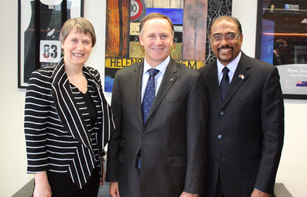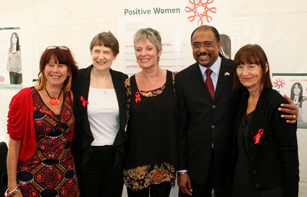
Feature Story
UNAIDS and UNDP commend New Zealand’s leadership in the HIV response
13 March 2012
13 March 2012 13 March 2012
(L to R): UNDP Administrator Helen Clark, Prime Minister John Key and UNAIDS Executive Director Michel Sidibé.
UNAIDS Executive Director Michel Sidibé and UNDP Administrator Helen Clark praised New Zealand as a model for the AIDS response in a joint meeting on 6 March with the country’s Prime Minister, John Key.
New Zealand implemented early evidence-based programmes to ensure that vulnerable populations receive priority attention and support that was essential to control the spread of HIV. In 1987, New Zealand was among the first countries to introduce needle—syringe programmes for people who use drugs. It was also a regional pioneer in decriminalizing sex work (2003) and sex between men (1986). These programmes and reforms are widely credited with having prevented the spread of HIV among populations at high risk of infection in New Zealand. Nationally, HIV prevalence remains low, with about 0.1% of the population living with HIV.
During the meeting, Mr Sidibé urged Prime Minister Key to champion the UNAIDS vision of vision of Zero new HIV infections, Zero discrimination and Zero AIDS-related deaths in the Pacific region. "You have already made so much progress. Drawing on this experience, New Zealand can be the first country in the Pacific region to show that getting to Zero is possible,” said the UNAIDS Executive Director.
We can never relax—this is a deadly disease, and there is no cure. If you are complacent, HIV prevalence rates can take off
Helen Clark, UNDP Administrator
The UNDP Administrator warned of the need for continued vigilance in the HIV response, even in low prevalence countries like New Zealand. “We can never relax—this is a deadly disease, and there is no cure,” said Ms Clark. “If you are complacent, HIV prevalence rates can take off.”
Throughout the three-day mission to New Zealand, Mr Sidibé and Ms Clark encouraged senior government officials to lift travel restrictions for seasonal workers visiting New Zealand. “HIV-related travel restrictions have no public health rationale and are at odds with New Zealand’s outstanding record on HIV and human rights,” said Mr Sidibé.
Official opening of centre for women living with HIV
On the eve of International Women’s Day, and as part of their official visit to New Zealand, Mr Sidibé and Ms Clark opened Positive Women Inc’s new premises and community house in Auckland for women living with HIV. The organization aims to raise awareness of HIV in the community through educational programmes, with a particular focus on HIV prevention and de-stigmatisation.

Co-founders of Positive Women Inc. Judith Ackroyd (far left) and Suzy Morrison (far right) with UNDP Administrator Helen Clark, National Coordinator for Positive Women and Asia Pacific UNAIDS PCB NGO Delegate, Jane Bruning (centre) and UNAIDS Executive Director Michel Sidibé.
"It is an honour for me to join you in the opening of this impressive community house. Your efforts to support and empower women living with HIV are a true testament of your commitment to the AIDS response," said Mr Sidibé. "Women are critical agents of change and that by harnessing our collective strengths, we can end this epidemic."
The community house has been designed as a safe and welcoming space for women living with HIV and their families. It offers weekly member lunches, a relaxation lounge, a computer corner and printing facilities. Members are encouraged to organize knitting circles and conversation groups with their peers. An on-site social worker attends to the social and psychosocial needs of women and their families.
“Women represent the invisible face of the AIDS epidemic,” said Jane Bruning, National Coordinator of Positive Women Inc. “These are women who run households, cook dinner, have jobs and raise families. They are the ones keeping everything together. So to be able to offer them a place to come for advice or just a chat and a cup of tea is extremely important.”



